Module 3 Unit 1 They sometimes work harder 课件+音频(共41张PPT)外研版九年级下册
文档属性
| 名称 | Module 3 Unit 1 They sometimes work harder 课件+音频(共41张PPT)外研版九年级下册 |
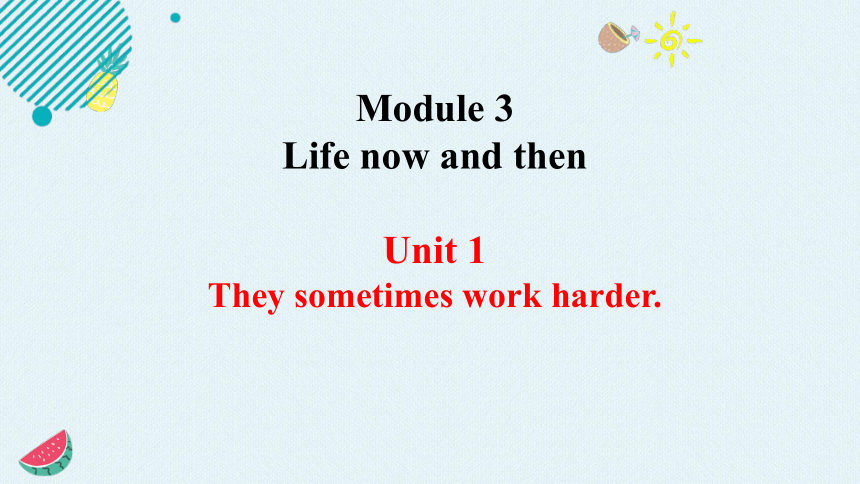
|
|
| 格式 | pptx | ||
| 文件大小 | 4.9MB | ||
| 资源类型 | 教案 | ||
| 版本资源 | 外研版 | ||
| 科目 | 英语 | ||
| 更新时间 | 2024-11-08 12:52:44 | ||
图片预览

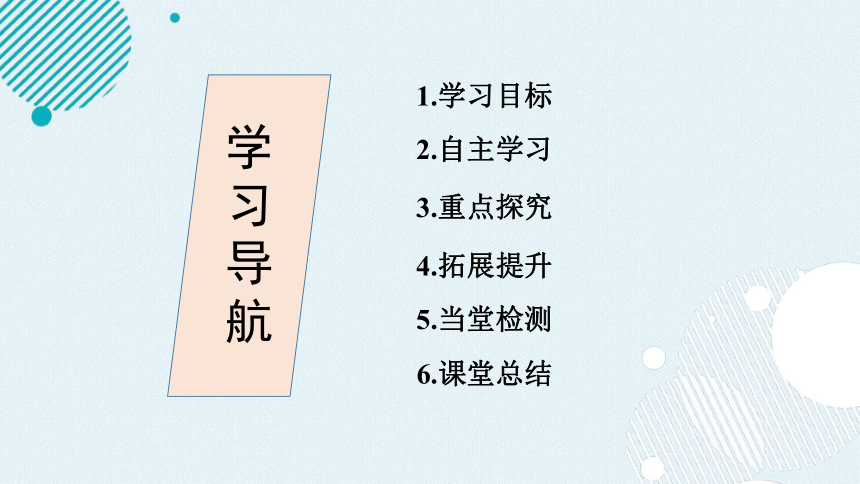
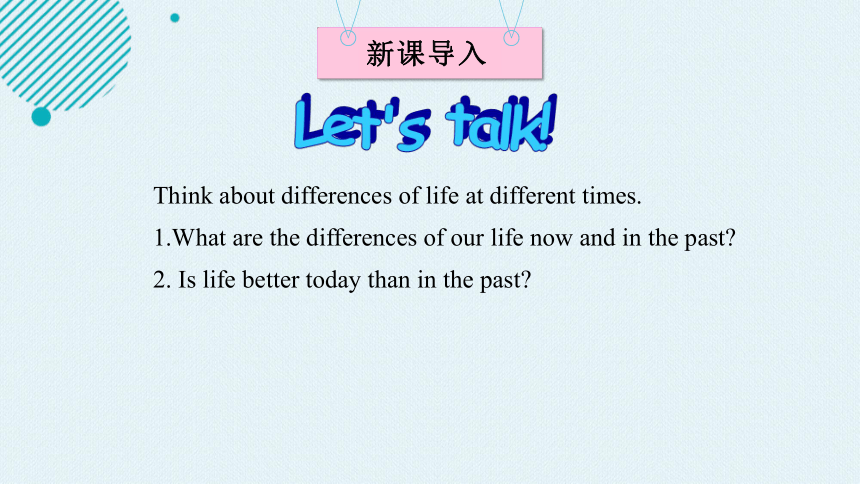
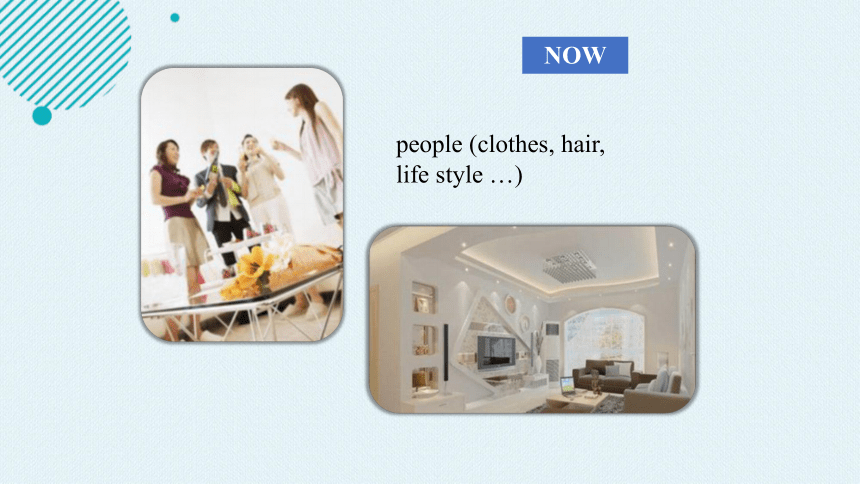

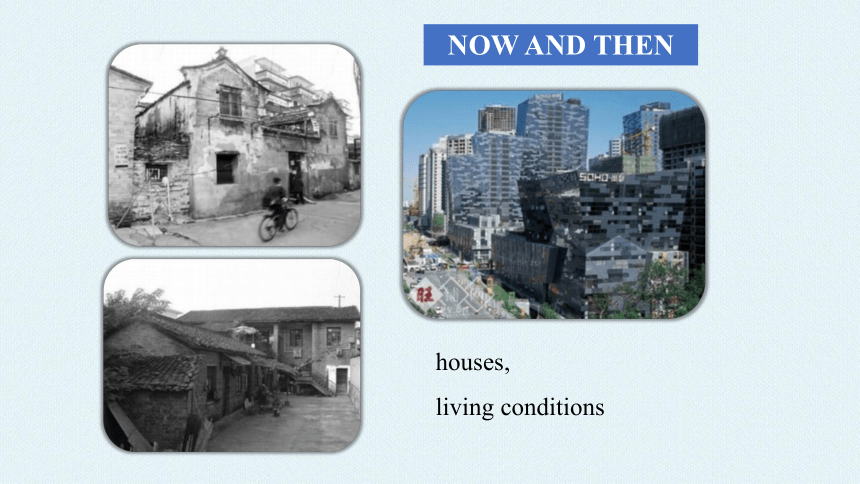
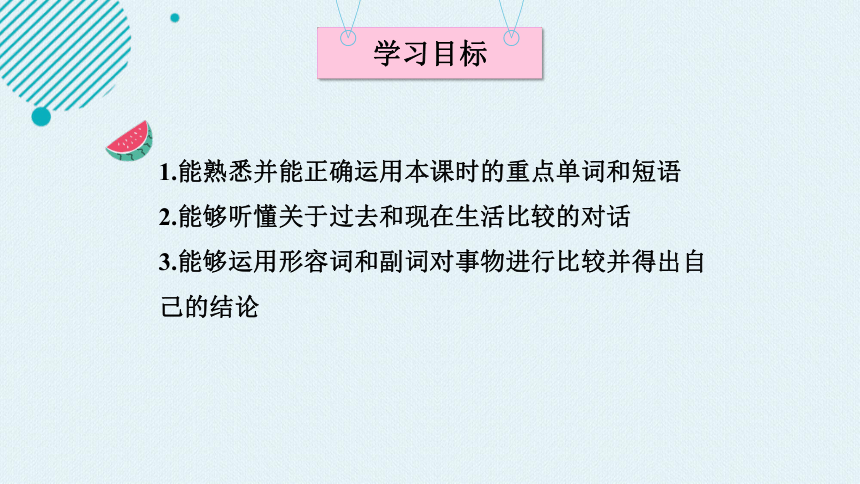
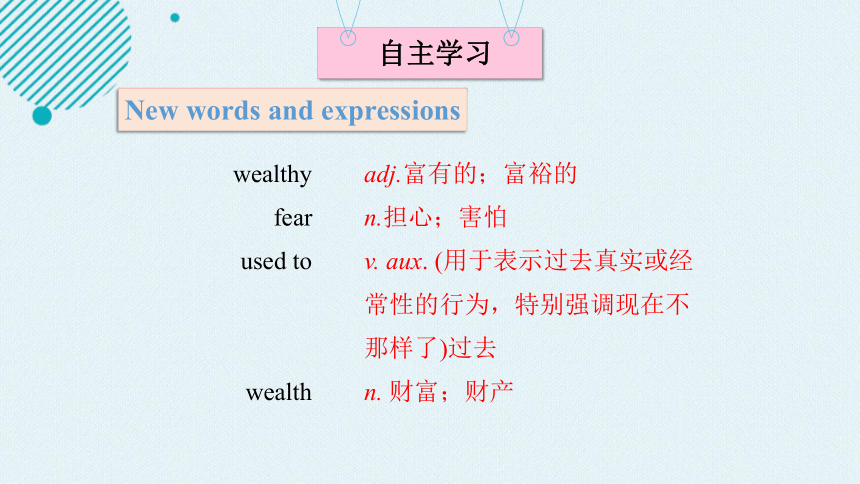
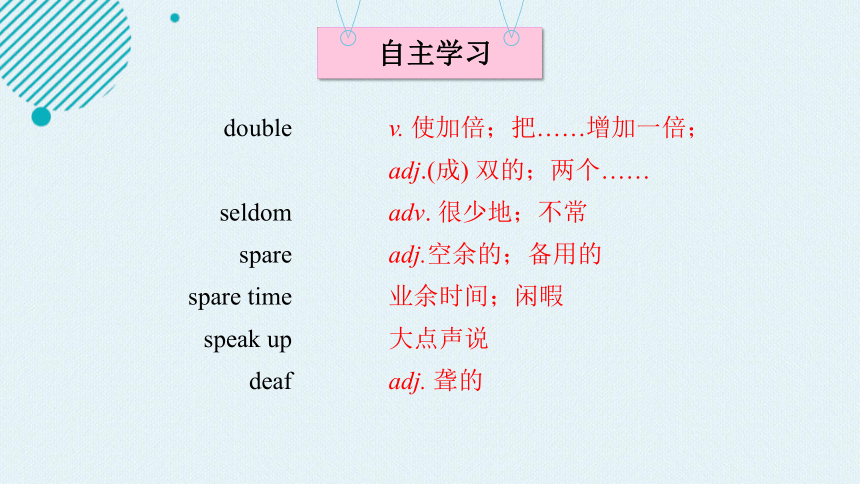
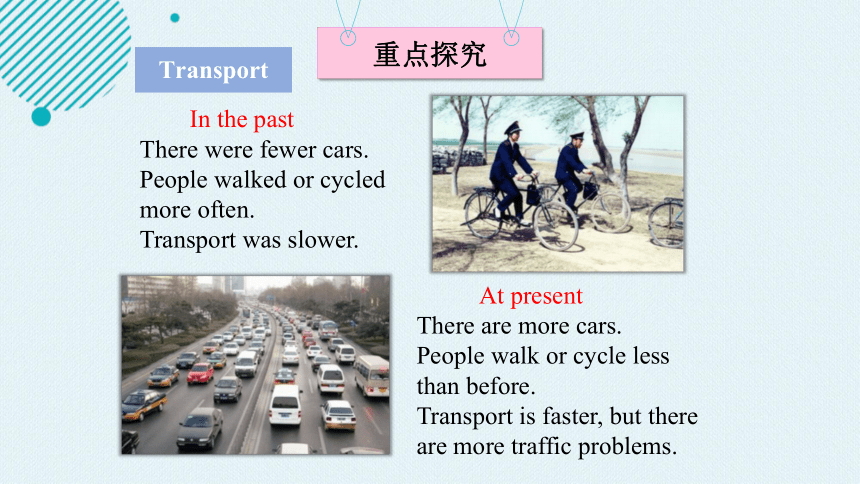
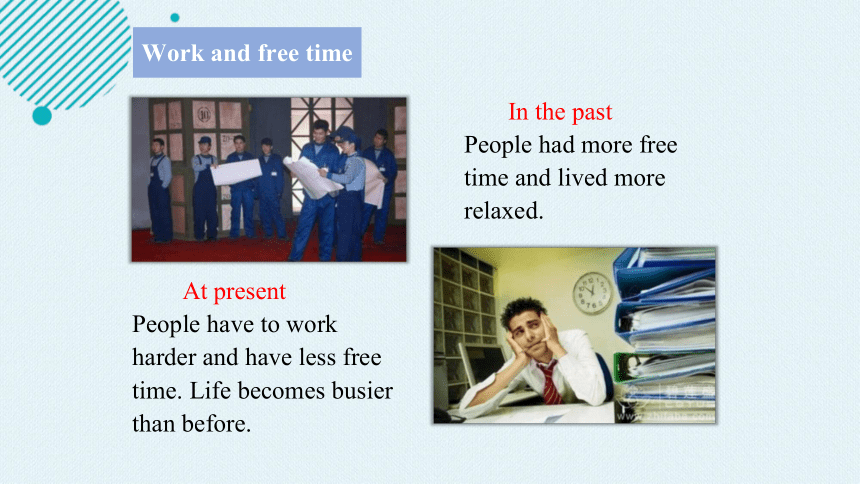
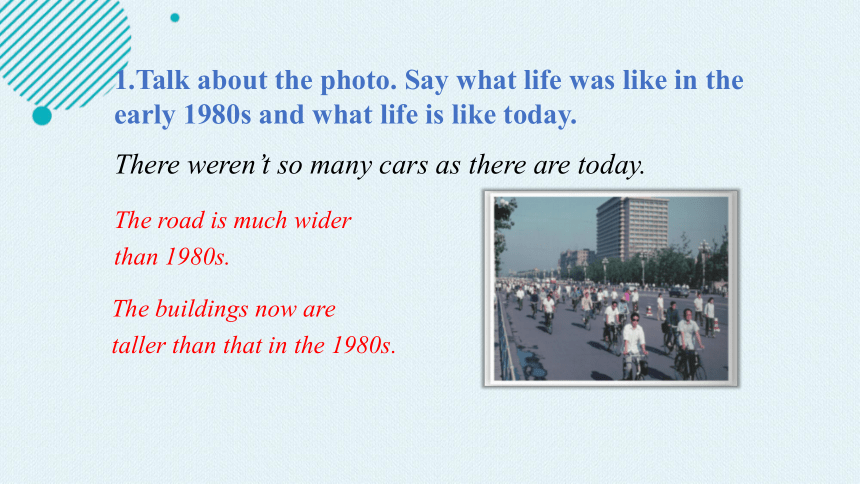
文档简介
(共41张PPT)
Module 3
Life now and then
Unit 1
They sometimes work harder.
1.学习目标
3.重点探究
2.自主学习
学习导航
5.当堂检测
6.课堂总结
4.拓展提升
新课导入
Think about differences of life at different times.
1.What are the differences of our life now and in the past
2. Is life better today than in the past
people (clothes, hair, life style …)
NOW
people (clothes, hair, life style …)
THEN
houses,
living conditions
NOW AND THEN
1.能熟悉并能正确运用本课时的重点单词和短语
2.能够听懂关于过去和现在生活比较的对话
3.能够运用形容词和副词对事物进行比较并得出自己的结论
学习目标
自主学习
New words and expressions
wealthy
fear
used to
wealth
adj.富有的;富裕的
n.担心;害怕
v. aux. (用于表示过去真实或经常性的行为,特别强调现在不那样了)过去
n. 财富;财产
自主学习
double
seldom
spare
spare time
speak up
deaf
v. 使加倍;把……增加一倍; adj.(成) 双的;两个……
adv. 很少地;不常
adj.空余的;备用的
业余时间;闲暇
大点声说
adj. 聋的
重点探究
Transport
At present
There are more cars.
People walk or cycle less than before.
Transport is faster, but there are more traffic problems.
In the past
There were fewer cars.
People walked or cycled more often.
Transport was slower.
Work and free time
In the past
People had more free time and lived more relaxed.
At present
People have to work harder and have less free time. Life becomes busier than before.
1.Talk about the photo. Say what life was like in the early 1980s and what life is like today.
There weren’t so many cars as there are today.
The road is much wider
than 1980s.
The buildings now are
taller than that in the 1980s.
Say what life is like today.
1. We should answer the question: is life today _____ than it was in the past.
2. Betty wants to write something such as _________ and ________.
3. Daming wants to write about personal safety. He thinks there are ______ accidents than in the past. Life is ______ certainly.
4. There are so many ______ to protect us today.
Listen and complete the sentences.
better
medicine
pollution
fewer
safer
laws
一层听
1. What is the history homework
2. What is the question they need to answer
3. What does Betty ask
4. What does Daming ask
Write about life in the past and life today.
The question is “Is life today better than it was in the past ”
Betty asks if they can write about medicine and pollution.
Daming asks if they can write about personal safety.
2. Listen and answer the questions.
二层听
3. Listen and read.
Mum: It’s getting late, Betty. How is your homework
Betty: Nearly finished. Mum, do you think that life is better today than in the past
Mum: Yes, of course, I do.
Betty: I do too. People are wealthier today, and they live longer than they did in the past.
Mum: That’s true. We know more about medicine today, and there’s less fear of getting ill because we know how to deal with the ordinary diseases. But people don’t take as much exercise as they used to.
Betty: I suppose that’s because more people have cars, and they walk or use their bikes less.
Mum: Some people think life in the past was simpler and healthier than today. More wealth sometimes means less health. When the number of cars is doubled, the pollution is also doubled, or even worse.
Betty: What about work Do people work as hard as they did fifty years ago
Mum: Yes, and they sometimes work harder. People seldom say they have enough spare time! Why don’t you go and ask Mrs Li, our neighbour She’s over seventy years old. She’s seen how life has changed.
Betty: That’s a good idea. I’ll go and ask her.
Mum: Remember to speak up! She’s a bit deaf now.
Nearly finished.
That’s true.
I suppose…
Everyday English
Now choose the correct answer.
1. People live longer today because ______.
a) we know more about medicine
b) they do not work as hard as they did
c) they take more exercise
2. There is less fear of getting ill ______.
a) so people live longer
b) because people know how to deal with
the ordinary diseases
c) so people work harder than before
a
b
b
b
3. People take less exercise because ______.
a) they do not need to
b) they drive cars instead
c) they do not have cars or bikes
4. People work harder today and ______.
a) they do not live as long as they did
b) they do not usually have enough free time
c) they live a healthier life
4. Complete the questions with the words or expression in the box.
1. What kinds of things do you __________
2. What do you do in your __________ time
3. What can someone not do if they are __________
4. If something is ____________, is it more or less
fear
spare
deaf
doubled
deaf, doubled, fear, spare, used to, wealth
5. Do you think people ____________ take
more exercise than they do today
6. Do you think people have more _______
today than they used to
used to
wealth
Now work in pairs.
Ask and answer.
deaf, doubled, fear, spare, used to, wealth
Both Betty and her mother think life is better today than in the past. People are _______ and live longer today. But people do __________ than they used to, because they use cars much more. And people sometimes __________ and has less _________ than they did fifty years ago. Although life in the past was ________ and _________, more people think life is better today.
Complete the passage with proper words.
wealthier
less exercise
work harder
spare time
simpler
healthier
5. Read and predict which words the
speaker is likely to stress.
◆ Some people think life in the past was simpler and healthier than today. More wealth sometimes means less health. When the number of cars is doubled, the pollution is also doubled, or even worse.
Some people think life in the past was simpler and healthier than today. More wealth sometimes means less health. When the number of cars is doubled, the pollution is also doubled, or even worse.
Now listen and check.
6. Read the paragraph in Activity 5 aloud.
7. Work in pairs. Answer the question and give your reasons.
—Is life better today than in the past
—Yes, it is. I think it’s because... / No, it isn’t. I think...
Now say what is better or worse in:
●education ●environment ●health
Is life better today than in the past
Yes, it is. I think it’s because the life is easier now.
advantages
People are wealthier, and live longer.
There's less fear of getting ill.
We know more about medicine.
They sometimes work harder.
disadvantages
People don't take as much exercise as they used to.
Pollution is doubled, or even worse.
Which kind of life do you prefer Life in the past or it is now Why
Discussion
拓展提升
Language points
1. Nearly finished! 快完成了。
这里finished 是形容词,表示“完成了的,结束了的”。
e.g. I hope it’ll be finished before 5 pm.
我希望可以在下午五点以前完成。
2. Mum, do you think that life is better today than in the past 妈妈,你认为现在的生活比过去的更好了吗?
比较级的常用句型:
(1) 比较级+ than, 表示“比…更…”
e.g. Health is more important than wealth.
健康比财富更重要。
(2) 比较级+and +比较级, 表示“越来越…”
e.g. The story gets more and more exciting.
这个故事越来越激动人心。
(3) the +比较级, the+比较级 表示“越…, 越…”
e.g. The more time you spend on it, the greater
progress you will make. 你在这上面花费
的时间越多, 你的进步就越大。
3. … and there’s less fear of getting ill because we know how to deal with the ordinary diseases. 我们也不太担心生病,因为我们知道如何治疗普通疾病。
fear n. 担心;害怕 in fear of … 担心;害怕
deal with 意思是“处理;安排;对付 ”,常与疑问副词how搭配使用。如:
e.g. Her brother feels no fear.她弟弟什么也不怕。
How will you deal with the thief who stole the diamond
你将如何处理那个偷了钻石的小偷呢?
4. But people don’t take as much exercise as they used to. 但是人们没有过去运动得多了。
(1) as…as… 同级比较, 否定句可以用not so/as…as...表示。as…as, not so…as中间用形容词、副词原级。
e.g. He is as tall as his father. 他和他的父亲一样高。
You are as clever as me. 你和我一样聪明。
(2) used to 指的是过去的习惯性动作, 目的在于与现在形成对照。
used to do sth. 指的是“过去常常做某事”,但是现在不做了。
e.g. I used to work hard. 我过去常常努力工作。
(暗含的意义是:我现在不努力工作了。)
I used to take an hour’s walk before breakfast.
我过去常常在早餐前散步一小时。
② be/get used to doing 表示习惯于做某事
e.g. I have got used to getting up early in the morning. 我已经习惯早起了。
I am used to eating rice now.
我现在习惯吃米饭。
拓展:
① be used to 被用来做
e.g. This knife is usually used to cut fruit.
这把小刀常被用于切水果。
5. I suppose that’s because more people have cars…
我猜那是因为更多的人有了车……
suppose在这里是一个动词, 意为“猜想, 认为”, 后面可以接that引导的宾语从句, 此时注意对宾语从句的否定要移到主句上来。
e.g. I don’t suppose that he is at home. 我认为他没在家。
拓展:
① 构成be supposed to do / be sth. 结构, 意为“(按规定、习惯、安排等)应当”。
e.g. You’re supposed to go to the hospital to look after your mom.
你应该去医院照顾你妈妈。
② 意为“假定,设想”, 后接that引导的宾语从句, 多用于祈使句中。
e.g. Suppose that you are going to Japan — what will you do there
假设你要去日本, 你会在那里干什么?
6. Remember to speak up! She’s a bit deaf now.
记得说话大点儿声,她现在有点儿耳背了。
speak up表示“大点儿声说”。
e.g. Speak up, please. I can’t hear you. 请大声一点儿, 我听不见你说话。
当堂检测
一、单词填空。1.The number of visitors is________(双倍的) during this Golden Week.2.The old woman is d________(聋的),so she can't hear anything.3.When we saw the boy in the street,he was shaking with f________(害怕;恐惧).4.Ma Yun is a________(wealth) businessman . 5.Junk food is bad for our health, so we should _______(不常) eat it.6.I s _______ it is going to rain tomorrow. Do you think so
doubled
eaf
ear
wealthy
seldom
uppose
二、完成句子。1. 以前在英格兰时,琳达每个星期天都去做礼拜。Linda ______ ______ _____ to church in England every Sunday.2.贝蒂闲暇时常去购物。Betty often goes shopping______ ______ ______ ______.3.丧生于交通事故的人很多。______ _______ ______people killed in traffic accidents is large.4.卫生部门现在知道如何对付这种病了。The health authorities now know _____ _____ ____ _____ the disease. 5.请大声点说,我听不清。Please ______ ______!I can't hear you clearly.
used to go
in her spare time
The number of
how to deal with
speak up
课堂总结
Module 3
Unit 1
1.听懂关于过去和现在生活比较的对话
2.运用形容词和副词对事物进行比较并得出自己的结论
重点单词和短语:
wealthy,fear,wealth,double,seldom,spare,deaf,used to,spare time, speak up,deal with, as...as
Module 3
Life now and then
Unit 1
They sometimes work harder.
1.学习目标
3.重点探究
2.自主学习
学习导航
5.当堂检测
6.课堂总结
4.拓展提升
新课导入
Think about differences of life at different times.
1.What are the differences of our life now and in the past
2. Is life better today than in the past
people (clothes, hair, life style …)
NOW
people (clothes, hair, life style …)
THEN
houses,
living conditions
NOW AND THEN
1.能熟悉并能正确运用本课时的重点单词和短语
2.能够听懂关于过去和现在生活比较的对话
3.能够运用形容词和副词对事物进行比较并得出自己的结论
学习目标
自主学习
New words and expressions
wealthy
fear
used to
wealth
adj.富有的;富裕的
n.担心;害怕
v. aux. (用于表示过去真实或经常性的行为,特别强调现在不那样了)过去
n. 财富;财产
自主学习
double
seldom
spare
spare time
speak up
deaf
v. 使加倍;把……增加一倍; adj.(成) 双的;两个……
adv. 很少地;不常
adj.空余的;备用的
业余时间;闲暇
大点声说
adj. 聋的
重点探究
Transport
At present
There are more cars.
People walk or cycle less than before.
Transport is faster, but there are more traffic problems.
In the past
There were fewer cars.
People walked or cycled more often.
Transport was slower.
Work and free time
In the past
People had more free time and lived more relaxed.
At present
People have to work harder and have less free time. Life becomes busier than before.
1.Talk about the photo. Say what life was like in the early 1980s and what life is like today.
There weren’t so many cars as there are today.
The road is much wider
than 1980s.
The buildings now are
taller than that in the 1980s.
Say what life is like today.
1. We should answer the question: is life today _____ than it was in the past.
2. Betty wants to write something such as _________ and ________.
3. Daming wants to write about personal safety. He thinks there are ______ accidents than in the past. Life is ______ certainly.
4. There are so many ______ to protect us today.
Listen and complete the sentences.
better
medicine
pollution
fewer
safer
laws
一层听
1. What is the history homework
2. What is the question they need to answer
3. What does Betty ask
4. What does Daming ask
Write about life in the past and life today.
The question is “Is life today better than it was in the past ”
Betty asks if they can write about medicine and pollution.
Daming asks if they can write about personal safety.
2. Listen and answer the questions.
二层听
3. Listen and read.
Mum: It’s getting late, Betty. How is your homework
Betty: Nearly finished. Mum, do you think that life is better today than in the past
Mum: Yes, of course, I do.
Betty: I do too. People are wealthier today, and they live longer than they did in the past.
Mum: That’s true. We know more about medicine today, and there’s less fear of getting ill because we know how to deal with the ordinary diseases. But people don’t take as much exercise as they used to.
Betty: I suppose that’s because more people have cars, and they walk or use their bikes less.
Mum: Some people think life in the past was simpler and healthier than today. More wealth sometimes means less health. When the number of cars is doubled, the pollution is also doubled, or even worse.
Betty: What about work Do people work as hard as they did fifty years ago
Mum: Yes, and they sometimes work harder. People seldom say they have enough spare time! Why don’t you go and ask Mrs Li, our neighbour She’s over seventy years old. She’s seen how life has changed.
Betty: That’s a good idea. I’ll go and ask her.
Mum: Remember to speak up! She’s a bit deaf now.
Nearly finished.
That’s true.
I suppose…
Everyday English
Now choose the correct answer.
1. People live longer today because ______.
a) we know more about medicine
b) they do not work as hard as they did
c) they take more exercise
2. There is less fear of getting ill ______.
a) so people live longer
b) because people know how to deal with
the ordinary diseases
c) so people work harder than before
a
b
b
b
3. People take less exercise because ______.
a) they do not need to
b) they drive cars instead
c) they do not have cars or bikes
4. People work harder today and ______.
a) they do not live as long as they did
b) they do not usually have enough free time
c) they live a healthier life
4. Complete the questions with the words or expression in the box.
1. What kinds of things do you __________
2. What do you do in your __________ time
3. What can someone not do if they are __________
4. If something is ____________, is it more or less
fear
spare
deaf
doubled
deaf, doubled, fear, spare, used to, wealth
5. Do you think people ____________ take
more exercise than they do today
6. Do you think people have more _______
today than they used to
used to
wealth
Now work in pairs.
Ask and answer.
deaf, doubled, fear, spare, used to, wealth
Both Betty and her mother think life is better today than in the past. People are _______ and live longer today. But people do __________ than they used to, because they use cars much more. And people sometimes __________ and has less _________ than they did fifty years ago. Although life in the past was ________ and _________, more people think life is better today.
Complete the passage with proper words.
wealthier
less exercise
work harder
spare time
simpler
healthier
5. Read and predict which words the
speaker is likely to stress.
◆ Some people think life in the past was simpler and healthier than today. More wealth sometimes means less health. When the number of cars is doubled, the pollution is also doubled, or even worse.
Some people think life in the past was simpler and healthier than today. More wealth sometimes means less health. When the number of cars is doubled, the pollution is also doubled, or even worse.
Now listen and check.
6. Read the paragraph in Activity 5 aloud.
7. Work in pairs. Answer the question and give your reasons.
—Is life better today than in the past
—Yes, it is. I think it’s because... / No, it isn’t. I think...
Now say what is better or worse in:
●education ●environment ●health
Is life better today than in the past
Yes, it is. I think it’s because the life is easier now.
advantages
People are wealthier, and live longer.
There's less fear of getting ill.
We know more about medicine.
They sometimes work harder.
disadvantages
People don't take as much exercise as they used to.
Pollution is doubled, or even worse.
Which kind of life do you prefer Life in the past or it is now Why
Discussion
拓展提升
Language points
1. Nearly finished! 快完成了。
这里finished 是形容词,表示“完成了的,结束了的”。
e.g. I hope it’ll be finished before 5 pm.
我希望可以在下午五点以前完成。
2. Mum, do you think that life is better today than in the past 妈妈,你认为现在的生活比过去的更好了吗?
比较级的常用句型:
(1) 比较级+ than, 表示“比…更…”
e.g. Health is more important than wealth.
健康比财富更重要。
(2) 比较级+and +比较级, 表示“越来越…”
e.g. The story gets more and more exciting.
这个故事越来越激动人心。
(3) the +比较级, the+比较级 表示“越…, 越…”
e.g. The more time you spend on it, the greater
progress you will make. 你在这上面花费
的时间越多, 你的进步就越大。
3. … and there’s less fear of getting ill because we know how to deal with the ordinary diseases. 我们也不太担心生病,因为我们知道如何治疗普通疾病。
fear n. 担心;害怕 in fear of … 担心;害怕
deal with 意思是“处理;安排;对付 ”,常与疑问副词how搭配使用。如:
e.g. Her brother feels no fear.她弟弟什么也不怕。
How will you deal with the thief who stole the diamond
你将如何处理那个偷了钻石的小偷呢?
4. But people don’t take as much exercise as they used to. 但是人们没有过去运动得多了。
(1) as…as… 同级比较, 否定句可以用not so/as…as...表示。as…as, not so…as中间用形容词、副词原级。
e.g. He is as tall as his father. 他和他的父亲一样高。
You are as clever as me. 你和我一样聪明。
(2) used to 指的是过去的习惯性动作, 目的在于与现在形成对照。
used to do sth. 指的是“过去常常做某事”,但是现在不做了。
e.g. I used to work hard. 我过去常常努力工作。
(暗含的意义是:我现在不努力工作了。)
I used to take an hour’s walk before breakfast.
我过去常常在早餐前散步一小时。
② be/get used to doing 表示习惯于做某事
e.g. I have got used to getting up early in the morning. 我已经习惯早起了。
I am used to eating rice now.
我现在习惯吃米饭。
拓展:
① be used to 被用来做
e.g. This knife is usually used to cut fruit.
这把小刀常被用于切水果。
5. I suppose that’s because more people have cars…
我猜那是因为更多的人有了车……
suppose在这里是一个动词, 意为“猜想, 认为”, 后面可以接that引导的宾语从句, 此时注意对宾语从句的否定要移到主句上来。
e.g. I don’t suppose that he is at home. 我认为他没在家。
拓展:
① 构成be supposed to do / be sth. 结构, 意为“(按规定、习惯、安排等)应当”。
e.g. You’re supposed to go to the hospital to look after your mom.
你应该去医院照顾你妈妈。
② 意为“假定,设想”, 后接that引导的宾语从句, 多用于祈使句中。
e.g. Suppose that you are going to Japan — what will you do there
假设你要去日本, 你会在那里干什么?
6. Remember to speak up! She’s a bit deaf now.
记得说话大点儿声,她现在有点儿耳背了。
speak up表示“大点儿声说”。
e.g. Speak up, please. I can’t hear you. 请大声一点儿, 我听不见你说话。
当堂检测
一、单词填空。1.The number of visitors is________(双倍的) during this Golden Week.2.The old woman is d________(聋的),so she can't hear anything.3.When we saw the boy in the street,he was shaking with f________(害怕;恐惧).4.Ma Yun is a________(wealth) businessman . 5.Junk food is bad for our health, so we should _______(不常) eat it.6.I s _______ it is going to rain tomorrow. Do you think so
doubled
eaf
ear
wealthy
seldom
uppose
二、完成句子。1. 以前在英格兰时,琳达每个星期天都去做礼拜。Linda ______ ______ _____ to church in England every Sunday.2.贝蒂闲暇时常去购物。Betty often goes shopping______ ______ ______ ______.3.丧生于交通事故的人很多。______ _______ ______people killed in traffic accidents is large.4.卫生部门现在知道如何对付这种病了。The health authorities now know _____ _____ ____ _____ the disease. 5.请大声点说,我听不清。Please ______ ______!I can't hear you clearly.
used to go
in her spare time
The number of
how to deal with
speak up
课堂总结
Module 3
Unit 1
1.听懂关于过去和现在生活比较的对话
2.运用形容词和副词对事物进行比较并得出自己的结论
重点单词和短语:
wealthy,fear,wealth,double,seldom,spare,deaf,used to,spare time, speak up,deal with, as...as
同课章节目录
- Module 1 Travel
- Unit 1 We toured the city by bus and by taxi
- Unit 2 It's a long story.
- Unit 3 Language in use
- Module 2 Education
- Unit 1 They don't sit in rows.
- Unit 2 What do I like best about school?
- Unit 3 Language in use
- Module 3 Life now and then
- Unit 1 They sometimes work harder.
- Unit 2 I think life is better today.
- Unit 3 Language in use.
- Module 4 Rules and suggestions
- Unit 1 You must be careful of falling stones.
- Unit 2 we must keep the camp clean.
- Unit 3 Language in use.
- Revison A
- Module 5 Look after yourself
- Unit 1 We'd better get you to hospital.
- Unit 2 Get off the sofa!
- Unit 3 Language in use.
- Module 6 Eating togethe
- Unit 1 When is the school-leavers' party?
- Unit 2 Knives and forks are used for most Western
- Unit 3 Language in use
- Module 7 English for you and me
- Unit 1 Have you ever been to an English corner?
- Unit 2 We all own English.
- Unit 3 Language in use
- Module 8 My future life
- Unit 1 Here's to our friendship and the future
- Unit 2 I know that you will be better at maths.
- Unit 3 Language in use
- Revison B
